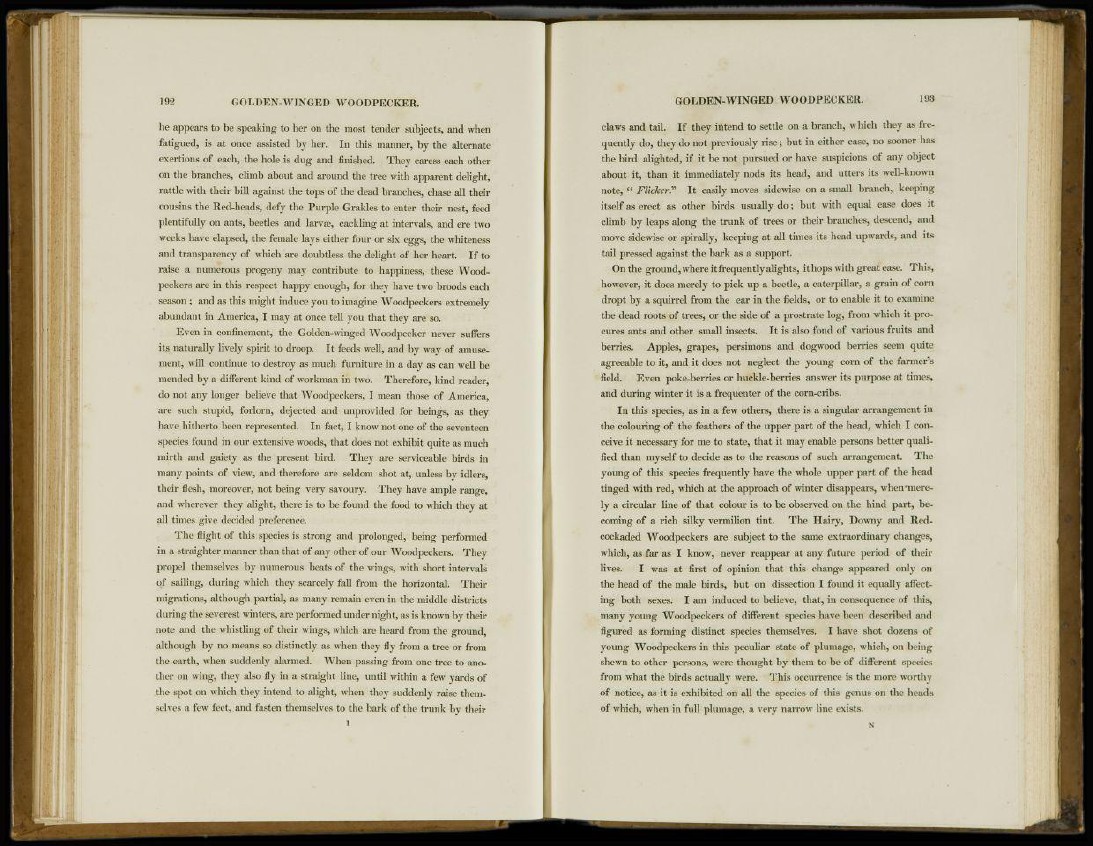
he appears to be speaking to her on the most tender subjects, and when
fatigued, is at once assisted by her. In this manner, by the alternate
exertions of each, the hole is dug and finished. They caress each other
on the branches, climb about and around the tree with apparent delight,
rattle with their bill against the tops of the dead branches, chase all their
cousins the Red-heads, defy the Purple Grakles to enter their nest, feed
plentifully on ants, beetles and larvae, cackling at intervals, and ere two
weeks have elapsed, the female lays either four or six eggs, the whiteness
and transparency of which are doubtless the delight of her heart. If to
raise a numerous progeny may contribute to happiness, these Woodpeckers
are in this respect happy enough, for they have two broods each
season ; and as this might induce you to imagine Woodpeckers extremely
abundant in America, I may at once tell you that they are so.
Even in confinement, the Golden-winged Woodpecker never suffers
its naturally lively spirit to droop. It feeds well, and by way of amusement,
will continue to destroy as much furniture in a day as can well be
mended by a different kind of workman in two. Therefore, kind reader,
do not any longer believe that Wroodpeckers, I mean those of America,
are such stupid, forlorn, dejected and unprovided for beings, as they
have hitherto been represented. In fact, I know not one of the seventeen
species found in our extensive woods, that does not exhibit quite as much
mirth and gaiety as the present bird. They are serviceable birds in
many points of view, and therefore are seldom shot at, unless by idlers,
their flesh, moreover, not being very savoury. They have ample range,
and wherever they alight, there is to be found the food to which they at
all times give decided preference.
The flight of this species is strong and prolonged, being performed
in a straighter manner than that of any other of our Woodpeckers. They
propel themselves by numerous beats of the wings, with short intervals
of sailing, during which they scarcely fall from the horizontal. Their
migrations, although partial, as many remain even in the middle districts
during the severest winters, are performed under night, as is known by their
note and the whistling of their wings, which are heard from the ground,
although by no means so distinctly as when they fly from a tree or from
the earth, when suddenly alarmed. When passing from one tree to another
on wing, they also fly in a straight line, until within a few yards of
the spot on which they intend to alight, when they suddenly raise themselves
a few feet, and fasten themselves to the bark of the trunk by their
l
claws and tail. If they intend to settle on a branch, which they as frequently
do, they do not previously rise; but in either case, no sooner has
the bird alighted, if it be not pursued or have suspicions of any object
about it, than it immediately nods its head, and utters its well-known
note, " Flicker.'''' It easily moves sidewise on a small branch, keeping
itself as erect as other birds usually do; but with equal ease does it
climb by leaps along the trunk of trees or their branches, descend, and
move sidewise or spirally, keeping at all times its head upwards, and its
tail pressed against the bark as a support.
On the ground, where itfrequently alights, it hops with great ease. This,
however, it does merely to pick up a beetle, a caterpillar, a grain of corn
dropt by a squirrel from the ear in the fields, or to enable it to examine
the dead roots of trees, or the side of a prostrate log, from which it procures
ants and other small insects. It is also fond of various fruits and
berries. Apples, grapes, persimons and dogwood berries seem quite
agreeable to it, and it does not neglect the young corn of the farmer's
field. Even poke-berries or huckle-berries answer its purpose at times,
and during winter it is a frequenter of the corn-cribs.
In this species, as in a few others, there is a singular arrangement in
the colouring of the feathers of the upper part of the head, which I conceive
it necessary for me to state, that it may enable persons better qualified
than myself to decide as to the reasons of such arrangement. The
young of this species frequently have the whole upper part of the head
tinged with red, which at the approach of winter disappears, when'merely
a circular line of that colour is to be observed on the hind part, becoming
of a rich silky vermilion tint. The Hairy, Downy and Redcockaded
Woodpeckers are subject to the same extraordinary changes,
which, as far as I know, never reappear at any future period of their
lives. I was at first of opinion that this change appeared only on
the head of the male birds, but on dissection I found it equally affecting
both sexes. I am induced to believe, that, in consequence of this,
many young Woodpeckers of different species have been described and
figured as forming distinct species themselves. I have shot dozens of
young Woodpeckers in this peculiar state of plumage, which, on being
shewn to other persons, were thought by them to be of different species
from what the birds actually were. This occurrence is the more worthy
of notice, as it is exhibited on all the species of this genus on the heads
of which, when in full plumage, a very narrow line exists.
N